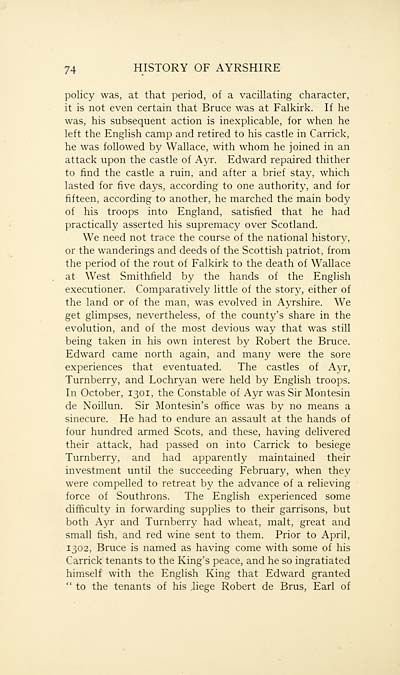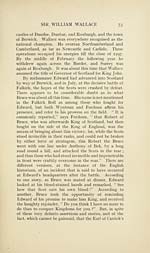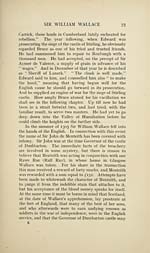Download files
Complete book:
Individual page:
Thumbnail gallery: Grid view | List view

74 HISTORY OF AYRSHIRE
policy was, at that period, of a vacillating character,
it is not even certain that Bruce was at Falkirk. If he
was, his subsequent action is inexplicable, for when he
left the English camp and retired to his castle in Carrick,
he was followed by Wallace, with whom he joined in an
attack upon the castle of Ayr. Edward repaired thither
to find the castle a ruin, and after a brief stay, which
lasted for five days, according to one authority, and for
fifteen, according to another, he marched the main body
of his troops into England, satisfied that he had
practically asserted his supremacy over Scotland.
We need not trace the course of the national history,
or the wanderings and deeds of the Scottish patriot, from
the period of the rout of Falkirk to the death of Wallace
at West Smithfield by the hands of the English
executioner. Comparatively little of the story, either of
the land or of the man, was evolved in Ayrshire. We
get glimpses, nevertheless, of the county's share in the
evolution, and of the most devious way that was still
being taken in his own interest by Robert the Bruce.
Edward came north again, and many were the sore
experiences that eventuated. The castles of Ayr,
Turnberry, and Lochryan were held by English troops.
In October, 1301, the Constable of Ayr was Sir Montesin
de Noillun. Sir Montesin's office was by no means a
sinecure. He had to endure an assault at the hands of
four hundred armed Scots, and these, having delivered
their attack, had passed on into Carrick to besiege
Turnberry, and had apparently maintained their
investment until the succeeding February, when they
were compelled to retreat by the advance of a relieving
force of Southrons. The English experienced some
difficulty in forwarding supplies to their garrisons, but
both Ayr and Turnberry had wheat, malt, great and
small fish, and red wine sent to them. Prior to April,
1302, Bruce is named as having come with some of his
Carrick tenants to the King's peace, and he so ingratiated
himself with the English King that Edward granted
" to the tenants of his Jiege Robert de Brus, Earl of
policy was, at that period, of a vacillating character,
it is not even certain that Bruce was at Falkirk. If he
was, his subsequent action is inexplicable, for when he
left the English camp and retired to his castle in Carrick,
he was followed by Wallace, with whom he joined in an
attack upon the castle of Ayr. Edward repaired thither
to find the castle a ruin, and after a brief stay, which
lasted for five days, according to one authority, and for
fifteen, according to another, he marched the main body
of his troops into England, satisfied that he had
practically asserted his supremacy over Scotland.
We need not trace the course of the national history,
or the wanderings and deeds of the Scottish patriot, from
the period of the rout of Falkirk to the death of Wallace
at West Smithfield by the hands of the English
executioner. Comparatively little of the story, either of
the land or of the man, was evolved in Ayrshire. We
get glimpses, nevertheless, of the county's share in the
evolution, and of the most devious way that was still
being taken in his own interest by Robert the Bruce.
Edward came north again, and many were the sore
experiences that eventuated. The castles of Ayr,
Turnberry, and Lochryan were held by English troops.
In October, 1301, the Constable of Ayr was Sir Montesin
de Noillun. Sir Montesin's office was by no means a
sinecure. He had to endure an assault at the hands of
four hundred armed Scots, and these, having delivered
their attack, had passed on into Carrick to besiege
Turnberry, and had apparently maintained their
investment until the succeeding February, when they
were compelled to retreat by the advance of a relieving
force of Southrons. The English experienced some
difficulty in forwarding supplies to their garrisons, but
both Ayr and Turnberry had wheat, malt, great and
small fish, and red wine sent to them. Prior to April,
1302, Bruce is named as having come with some of his
Carrick tenants to the King's peace, and he so ingratiated
himself with the English King that Edward granted
" to the tenants of his Jiege Robert de Brus, Earl of
Set display mode to:
![]() Universal Viewer |
Universal Viewer | ![]() Mirador |
Large image | Transcription
Mirador |
Large image | Transcription
Images and transcriptions on this page, including medium image downloads, may be used under the Creative Commons Attribution 4.0 International Licence unless otherwise stated. ![]()
| Histories of Scottish families > Ayrshire > Volume 1 > (84) Page 74 |
|---|
| Permanent URL | https://digital.nls.uk/95195294 |
|---|
| Attribution and copyright: |
|
|---|
| Description | A selection of almost 400 printed items relating to the history of Scottish families, mostly dating from the 19th and early 20th centuries. Includes memoirs, genealogies and clan histories, with a few produced by emigrant families. The earliest family history goes back to AD 916. |
|---|

